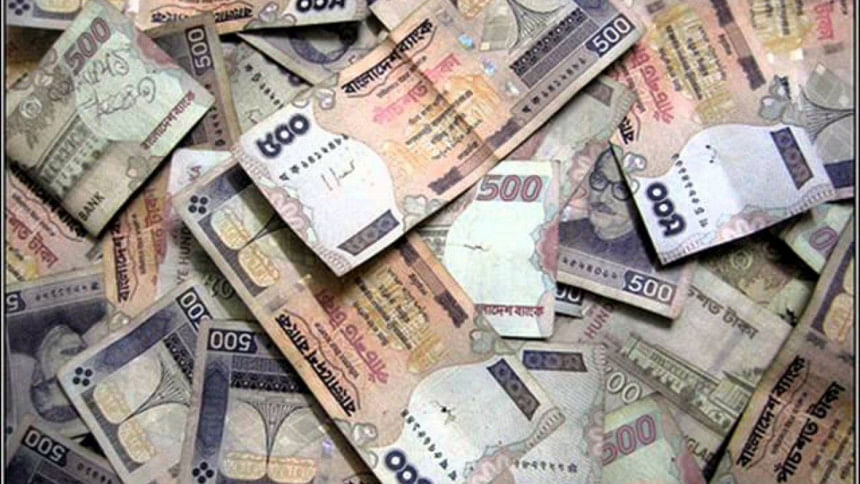Preventing illicit money outflow

Siphoning off money and repatriating it to foreign lands has been a systemic problem in Bangladesh for at least a decade. We are informed by a draft assessment report by the Asia Pacific Group on Money Laundering (APG) that Bangladesh runs the risk of being labelled a 'risky country' unless steps are taken to tackle money laundering and terror financing. According to a report published in The Daily Star on April 4, "US$55.88 billion has been siphoned off from Bangladesh in the past 10 years, according to Washington-based research and advisory organisation Global Financial Integrity".
We first made the news of being a "risky" country in 2010 but managed to wean ourselves away from that branding in 2014, thanks to prudent policy measures. That we are again running the risk of going back to "risky" spells trouble for our ratings and image. What becomes clear from the APG and other reports by Global Financial Integrity (GFI) is that not enough is being done by the Bangladesh Financial Intelligence Unit (BFIU) to collaborate with other international agencies in an effort to restrict money laundering and funding terrorist activities.
Indeed, we understand from the statements made by BFIU representatives that the upholding of standards has everything to do with the implementation of technical standards set by APG (Bangladesh is also member of APG). Terror financing and the illicit flow of funds remain global problems. Other countries have far greater experience handling and countering these channels of funds and our central bank needs to get a move on in improving areas of deficiency. Apparently we have scored "medium" in certain crucial standards, viz., exchange of accurate information, financial intelligence programme, and steps taken against terrorists and their assets. What is clear is that Bangladesh has submitted technical compliance response and effective response measures to APG last April and June, but as the latest draft report points out, we still have a lot more to do, particularly due to a lack of coordination between relevant ministries, division and agencies.
When we take into context the areas of illicit fund flow, it is trade mis-invoicing that remains the primary tool for illegal transfer of funds out of a country. This practice involves where trading partners write their own trade documents, or arrange to have the documents prepared in a third country (also known as re-invoicing). The practice, according to a report by GFI, allows for "fraudulent manipulation of the price, quantity, or quality of a good or service on an invoice allows criminals, government officials, and commercial tax evaders to shift vast amounts of money across international borders quickly, easily, and nearly always undetected." The study "Illicit Financial Flows from Developing Countries: 2004 – 2013" prepared by GFI covers only mis-invoicing of goods trade. And although Bangladesh does not come in the top five Asian countries involved in IFF over the ten year period covered, the funds that have flown out over the decade is roughly 1.5 times the current fiscal budget of Bangladesh.
So what is to be done to prevent Bangladesh from being demoted? BB has assured that necessary improvements will be made by July to avoid being labelled "risky". And it is not merely a set of measures that BB must take, rather, steps have to be taken by a wide range of agencies, including the National Board of Revenue, law enforcement agencies and several government departments, simply due to the fact that combating the illicit flow of funds requires a collaborative approach between and among various bodies. As is evident from a report published in this paper on April 4, "a delegation of the APG visited Bangladesh last October to inspect different initiatives to restrict money laundering and terrorist funding. During the visit, the team couldn't get any clear idea about which government agency leads probes in lawsuits over money laundering and terror financing."
As pointed out by Financial Action Task Force, an inter-governmental body established in 1989, which sets standards and promotes effective implementation of legal, regulatory and operational measures for combating money laundering, terrorist financing and other related threats to the integrity of the international financial system: "Regulators and law enforcement officials must strongly enforce all anti-money laundering laws and regulations already on the books. This includes prosecuting criminal charges against and imposing appropriate penalties upon employees of financial intuitions who are culpable of allowing money laundering to occur."
Precisely what steps the government is going to take to tackle the twin problems of money laundering and terror financing is up to the policymakers. That we cannot merely sit by and let things continue is obvious. But what is evident is that merely having good intentions and policies are not enough to combat money laundering. It is enforcement of those policies that bring about changes. It is either that, or, ending up a few notches down in the list of countries that are considered most risk-prone in terms of money laundering and terror financing.
The writer is Assistant Editor, The Daily Star.

 For all latest news, follow The Daily Star's Google News channel.
For all latest news, follow The Daily Star's Google News channel. 



Comments